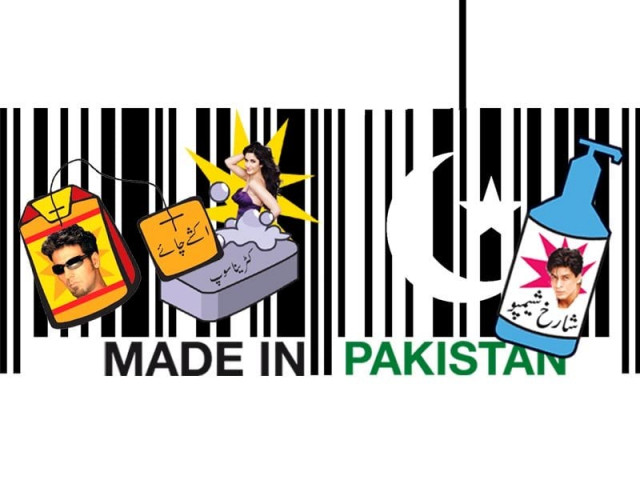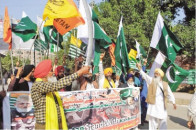Slaves to brands or branded slaves?
How relevant are Bollywood actors when we purchase different products?

How relevant are Bollywood actors when we purchase different products? DESIGN: ANUSHAY FURQAN
A casual dinner at a restaurant turned out to be an eye opener for me when oohs and aahs of admiration of a friend’s new and expensive designer clutch were followed by compliments on mine.
I figured a polite “thank you” would’ve sufficed till I was asked if my bag was branded. A little taken aback, I replied in the negative, only to be told “But it’s really nice!” Well ladies, news flash! Things can be nice without being branded and simply being branded does not guarantee it will be nice.
That night food for thought left no room for dessert. What has happened to us? How have we evolved? Do we value people today for who they are or for what they wear? Have we become so brand conscious that we have lost our individuality in the process? And most importantly, what do brands really represent?
Historically, branding marked ownership; it could’ve been branding of animals or that of humans (slaves). This connotation attained further negativity when convicts were branded as a sign of disgrace. But with the passage of time “branding” of a product became a marketing tool to give it recognition and then allow the manufacturer to build an image around that product, elevating its status to that of an object of desire; this object is usually expensive and out of reach.
When that is not the case and products have to battle for their market share, branding and brand ambassadors are used to attract the customer. But how relevant are these brand ambassadors to their end consumer? How relevant are Bollywood actors to us when we have to choose a shampoo or beverage when out grocery shopping?
I was asked by two women at a local general store which brand of tea I would recommend because in their words, they “trusted me more than some Bollywood actor” as I would never endorse something unless I believed in it myself. It reminded me of a certain brand of spices that broke away loyal customers from another brand, through a campaign that tugged at the heart strings as much as it tickled the palate. A story of two sisters bonded by family recipes, felt so real because Naveed Shehzad and Shamim Hilali are not just celebrities — they are women whose image resonates with housewives across Pakistan. That is intelligent branding — something the local consumer can relate to.
On the other hand, there is the argument that Pakistani consumers today are obsessed with Bollywood stars and hence multi-national companies (MNCs) simply give them what they want — Indian stars selling everything from creams, shampoos and soaps to beverages and even lawn. If that really was the case, lawn manufacturers using Bollywood actors as their brand ambassadors would have swept the market clean but interestingly, the market leaders in lawn are still those who sell out on the strength of their product and by maintaining a Pakistani identity. This in itself is an indication that the entire Pakistani population is not necessarily Bollywood-centric.
As one commentator on social media pointed out, the average Pakistani can see through India’s “aman ka tamasha” of sending back our hockey players and artists and compelling their own King Khan to give explanations justifying his Indian nationalism. How then, can SRK be an icon for us? But perhaps he should be…if only he could teach us a lesson on nationalism.
Many Pakistanis with an obsession for all things Indian, do not view this as an issue. They mock replacing SRK, Saif Ali Khan, Katrina Kaif and Kareena Kapoor with Shaan, Moammar Rana, Meera and Reema, forgetting that a large segment of the public does own them. Similarly, why don’t MNCs based in Pakistan use Pakistani athletes, singers and drama stars for their regional campaigns when they are equally popular in India despite state bans?
The truth is that it’s all about running a business. MNCs today cut costs by developing a campaign for the region but part of their agenda is also to woo India as one of the largest markets in the world. This is why we saw Indian contestants being crowned Miss World and Miss Universe in one year, we saw India being recognised at the Oscars (even if it was selling India’s poverty according to many Indians) and today Bollywood is being used to promote products that are sold to over a billion people in that country.
While it serves their purpose to use the same campaign for the entire region, it is a cause of concern for us as a nation — not because we are creatively challenged but because we lose out on the opportunity to create original, indigenous material. We cannot deny that MNCs do provide employment to the local population but that in turn, is also their end consumer. We cannot overlook many wonderful corporate social responsibility (CSR) initiatives of these companies either but must also bear in mind that tax cuts based on these initiatives also benefit their business.
We cannot fault these companies on how they run their business but we can question our state for not implementing a check-and-balance system. What is even more disturbing is the attitude we Pakistanis have towards our own. We complain of lack of creativity but just the ad campaigns of some telecom companies prove contrary to that. We lament that we have no heroes but we do not endeavour to build or create any. We mock our own icons like Maula Jutt and Rangeela but lack the vision to use them intelligently. We would rather import a Mr Bean look-alike, who has no relevance to Pakistan, to be the face of a national institution or worse, get a J J Valaya to design our lawn which is actually something we understand and do far better than the Indians.
This is truly our national deficit — a loss of pride and ownership where we prefer to not be identified as Pakistanis; a loss of individuality and identity where we ridicule our own language and culture and mock those who uphold it. Today, we are a branded nation — slaves to our inferiority complex which we justify in the name of globalisation. We do not create our own brands that uphold our own values and people. We do not question the government that fails in its responsibilities towards safeguarding the interest of its people. We accept what is dished to us allowing the brand managers to dictate that is what we want.
But we do have a choice — reject what we don’t agree with and be heard, start believing in “made in Pakistan” again and shrug off the shackles of a “branded” mindset that has enslaved us for years. We can do all that and more if only we have the will and the style to wear our identity with pride and joy that we have probably reserved for wearing this seasons Prada bag!
Published in The Express Tribune, February 2nd, 2013.
Like Life & Style on Facebook for the latest in fashion, gossip and entertainment.



















COMMENTS
Comments are moderated and generally will be posted if they are on-topic and not abusive.
For more information, please see our Comments FAQ